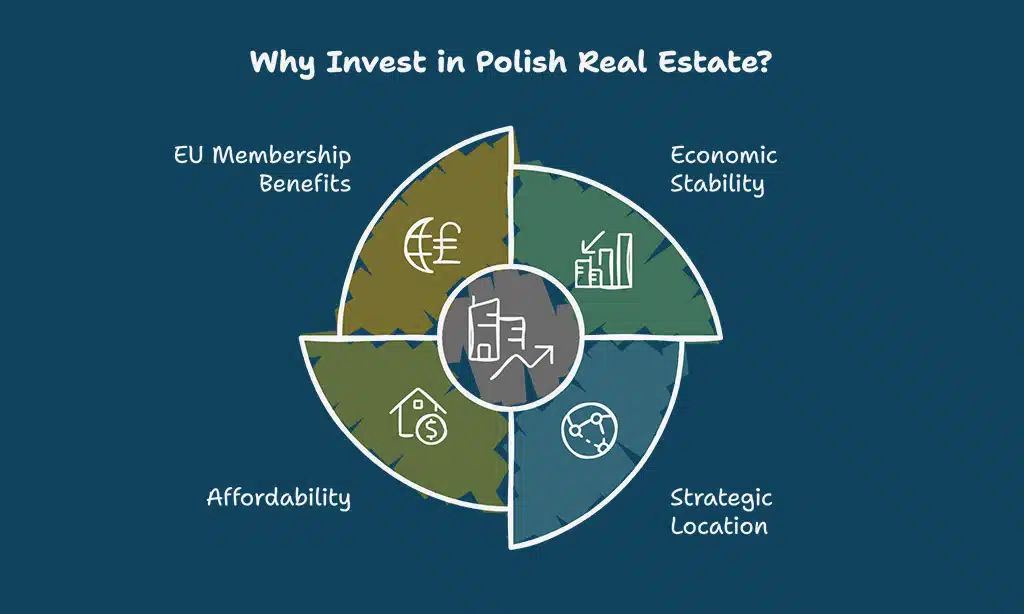Buying property in Poland as a foreigner is an increasingly popular choice due to the country’s strong economy, strategic location, and affordable property prices compared to many Western European nations.
However, the process of purchasing property in Poland is subject to a variety of legal requirements that must be adhered to in order to ensure compliance with Polish law.
Navigating these requirements can be complex for non-residents, so understanding them thoroughly is crucial to making the purchase process smooth and legal.
This article will walk you through the 8 legal requirements for buying property in Poland as a foreigner, providing insights, examples, and useful information to help you understand the legal framework, avoid potential pitfalls, and ensure a successful investment in Poland’s property market.
Why Foreigners Are Interested in Buying Property in Poland
Poland has become an attractive destination for foreigners looking to invest in property. Whether you are considering it as a retirement plan, an investment, or a place to live, the country offers a dynamic and growing real estate market.
In particular, its vibrant cities such as Warsaw, Krakow, Wroclaw, and Gdansk are in high demand, both from foreign investors and locals alike. However, foreign buyers need to ensure they comply with Polish legal requirements to avoid complications during the property purchase process. From understanding eligibility criteria to navigating tax obligations and securing financing, this article breaks down the 8 legal requirements for buying property in Poland as a foreigner.
Why Foreigners Choose to Buy Property in Poland
Before diving into the 8 legal requirements for buying property in Poland as a foreigner, let’s quickly examine why so many foreigners choose Poland as a destination for property investment:
- Strong and Stable Economy: Poland has one of the fastest-growing economies in Europe, with a stable political environment and low unemployment rates. This economic stability makes Poland an attractive market for property investment.
- Strategic Location: Poland is centrally located in Europe, which offers easy access to neighboring countries like Germany, Ukraine, and Czech Republic. It’s an ideal hub for business, travel, and trade.
- Low Cost of Living and Affordable Property: Poland’s property market remains relatively affordable compared to other European countries, such as France, Germany, or the UK. Many cities offer modern amenities at a fraction of the cost of their Western counterparts.
- EU Membership Benefits: As a member of the European Union, Poland offers foreign buyers the benefit of living, working, and traveling freely within the EU. Additionally, foreign buyers may also benefit from access to EU funding and grants in certain sectors.
For many foreign buyers, these factors make Poland an appealing place to purchase both residential and commercial properties. However, it’s important to ensure compliance with the legal requirements for buying property in Poland as a foreigner to protect your investment.
8 Legal Requirements for Buying Property in Poland as a Foreigner
Poland has become an increasingly attractive destination for foreign buyers looking to invest in real estate. Its growing economy, affordable property prices, and strategic location within the European Union make it a desirable market.
Whether you’re purchasing a property as a long-term investment, a second home, or a place to retire, the process of buying property in Poland involves a series of legal steps that you need to be aware of.
This article will guide you through the 8 legal requirements for buying property in Poland as a foreigner, offering detailed insights into the rules and regulations that foreign buyers must follow. It’s important to familiarize yourself with these requirements to ensure that the property transaction is legally sound, secure, and free from complications.
1: Eligibility to Purchase Property
General Rules for Foreigners
Foreign nationals, whether from EU or non-EU countries, can generally purchase property in Poland. However, the rules vary depending on the buyer’s nationality and whether the buyer intends to use the property for residential or business purposes.
For example, a U.S. citizen interested in buying residential property in Poland will need to apply for permission from the Polish Ministry of Interior, as non-EU citizens are subject to stricter requirements. This is unlike EU citizens, who are allowed to purchase property in Poland with no special restrictions other than some limitations on agricultural land.
EU/EEA Citizens
Citizens of the EU and European Economic Area (EEA) countries do not face significant restrictions on property purchases in Poland. EU/EEA nationals can buy residential, commercial, and industrial properties without requiring special permissions, making the process much simpler. However, these buyers still must adhere to Poland’s property laws regarding zoning and land use.
Non-EU Foreign Nationals
Non-EU nationals are subject to additional regulations. In particular, if they want to purchase residential property, they will need to apply for permission from the Polish Ministry of Interior. The process of acquiring this permission can be lengthy, so it’s important to account for the extra time required when purchasing property.
Eligibility Requirements for Foreign Buyers
| Buyer Type | Eligibility to Buy Property |
| EU/EEA Citizens | No restrictions, except for agricultural land. |
| Non-EU Citizens (Living in Poland) | Can purchase residential property with some conditions; no special permission needed for commercial property. |
| Non-EU Citizens (Not Living in Poland) | Requires permission from the Ministry of Interior for residential properties, subject to additional criteria for agricultural land. |
2: Acquiring Permission from the Ministry of Interior
When Permission Is Needed
For non-EU citizens, acquiring property in Poland requires obtaining permission from the Ministry of Interior. This applies mostly to residential properties and agricultural land, but it is typically not needed for commercial real estate transactions.
Permission is granted based on factors such as whether the buyer has lived in Poland for an extended period, has established a business in the country, or intends to reside in Poland.
The Application Process
The application process for permission can take several months and involves submitting a number of documents, including proof of identity, proof of funds, and a detailed plan showing the buyer’s intention to use the property.
It is strongly advised to hire a legal expert or real estate agent experienced with these applications to avoid delays and ensure the paperwork is completed correctly.
Interactive List: Documents Required for Permission Application
- Valid passport
- Proof of residence (if applicable)
- Proof of business interest or employment in Poland (if relevant)
- Detailed explanation of the property purchase purpose
Key Steps in the Permission Application Process
| Step | Description |
| Step 1: Collect Required Documents | Gather documents such as proof of identity, proof of residence, and proof of business interest. |
| Step 2: Submit Application to Ministry of Interior | Submit the application form and all required documents. |
| Step 3: Wait for Approval | The approval process can take several months. |
| Step 4: Receive Permission | If granted, you can proceed with the property purchase. |
3: Types of Property Foreigners Can Buy
Residential vs. Commercial Properties
Foreigners can purchase both residential and commercial properties in Poland, but there are restrictions on the types of residential properties they can buy. For example, foreigners may face challenges purchasing agricultural land and forest properties.
Agricultural Land Restrictions
Poland has stringent regulations regarding the purchase of agricultural land. Foreign buyers can only purchase agricultural land under certain conditions, such as having lived in Poland for a minimum of five years or purchasing land for agricultural business development. This is designed to protect Poland’s agricultural sector from foreign acquisitions.
Interactive List: Property Types Available for Foreign Buyers
- Residential Property: Available to EU/EEA citizens and non-EU citizens with permission.
- Commercial Property: Available to both EU/EEA and non-EU citizens without restrictions.
- Agricultural Land: Restricted for non-EU buyers, with exceptions based on residency or business purpose.
- Forest Land: Generally restricted for foreign buyers, regardless of nationality.
Restrictions on Agricultural Land Purchase
| Property Type | Eligibility for Foreigners |
| Residential Property | Available to EU/EEA citizens and non-EU citizens with permission. |
| Commercial Property | Open to all foreign buyers, no restrictions. |
| Agricultural Land | Limited to non-EU citizens with a business interest or five years of residency. |
| Forest Land | Generally restricted for all foreign buyers. |
4: Notary Involvement in Property Transactions
Role of the Notary in the Buying Process
In Poland, all property transactions must be conducted before a notary public. The notary’s role is to ensure that the transaction is legal, and that both parties are fulfilling their obligations. The notary checks the legal status of the property, verifies that the seller is the rightful owner, and ensures the agreement is in compliance with Polish law.
The Costs and Steps Involved
The notary’s fees are typically based on the value of the property being purchased. These fees range from 1% to 2% of the transaction value, and they are usually paid by the buyer. Once the notary finalizes the deed, they will file it with the Land and Mortgage Register, which officially registers the property under the buyer’s name.
Example Case: The Notary Process
Anna, a German national, purchased a flat in Warsaw through a real estate agency. After agreeing on the price and terms with the seller, she met with a notary, who reviewed the contract, checked the property’s legal status, and confirmed the absence of liens or disputes. The transaction was completed after she paid the notary fees, and the deed was filed with the Land and Mortgage Register.
Notary Process Checklist
| Step | Description |
| Step 1: Review of Documents | The notary ensures all documents are in order. |
| Step 2: Signing the Contract | Both parties sign the agreement in front of the notary. |
| Step 3: Payment | The buyer pays the agreed amount, and the notary ensures the payment process is correct. |
| Step 4: Registration | The notary registers the transaction with the Land and Mortgage Register. |
5: Financing Property in Poland as a Foreigner
Can Foreigners Obtain a Mortgage?
Foreigners can secure mortgages in Poland, but the process differs from that for Polish nationals. Non-EU foreigners typically face higher down payments and may need to provide additional documentation to prove financial stability.
Documentation Required for Financing
To apply for a mortgage, foreigners will need to provide various documents, including proof of income, a valid passport, and a Polish bank account, among others. Additionally, the mortgage approval process may take longer, and foreigners can expect to pay a down payment of around 30% to 40%.
Interactive List: Key Documents for Mortgage Approval
- Proof of income (e.g., salary slips or tax returns)
- Bank references
- Passport and/or national ID
- Proof of residence (if applicable)
- Property purchase agreement
Typical Mortgage Requirements for Foreign Buyers
| Document | Required for Foreign Buyers |
| Proof of Identity | Passport or national ID. |
| Proof of Income | Salary slips, tax returns, or bank statements. |
| Bank References | Letters from your bank to confirm financial stability. |
| Property Agreement | Signed agreement for the property purchase. |
6: Taxes and Fees for Foreign Buyers
Property Purchase Taxes
Foreign buyers are subject to taxes when purchasing property in Poland. The most notable tax is the stamp duty, which is generally 2% of the purchase price. Additionally, if the property is newly constructed, VAT at a rate of 8% may apply.
Ongoing Property Ownership Taxes
Foreign property owners must also pay an annual property tax, which is based on the property’s value. The property tax rate ranges from 0.1% to 2%, depending on the property’s location and size. Buyers should budget for these costs when planning their purchase.
Taxes and Fees for Foreign Buyers
| Tax Type | Rate |
| Stamp Duty | 2% of the purchase price |
| VAT (New Properties) | 8% on newly constructed properties |
| Annual Property Tax | 0.1% to 2% depending on property value |
7: Registration of Property Ownership
Role of the Land and Mortgage Register
Once the property transaction is completed, it must be registered with the Land and Mortgage Register. This is a crucial step in the property purchase process, as it legally formalizes the ownership transfer. The registration provides public evidence of ownership and protects the buyer’s legal rights to the property.
Registration Process
To register a property, the buyer must submit the notarial deed of sale, proof of payment, and other relevant documentation. The process can take several weeks, and it is essential for the buyer to follow up with the authorities to ensure that the registration is completed properly.
Registration Process Steps
| Step | Description |
| Step 1: Collect Documents | Submit the notarial deed and payment proof. |
| Step 2: Visit Land Register | Submit documents to the Land and Mortgage Register. |
| Step 3: Receive Confirmation | Await confirmation that ownership has been updated. |
8: Obtaining a PESEL Number
What Is a PESEL Number and Why Is It Necessary?
The PESEL number is a Polish identification number assigned to individuals residing in Poland. While EU nationals can use their existing identification, non-EU nationals must obtain a PESEL number for legal and financial purposes, including property purchases.
How to Obtain a PESEL Number
To obtain a PESEL number, non-EU citizens need to visit a local municipal office with their passport and proof of residence. The process typically takes a few weeks, and it is essential to complete this step early in the property purchasing process.
PESEL Number Application Process
| Step | Description |
| Step 1: Visit Municipal Office | Go to the nearest municipal office to apply for the PESEL number. |
| Step 2: Provide Documents | Submit your passport, proof of residence, and any other required documents. |
| Step 3: Await Processing | Processing usually takes a few weeks. |
| Step 4: Receive PESEL Number | Once approved, you’ll receive your PESEL number. |
Final Words: Navigating the Legal Process for Foreign Property Buyers in Poland
Buying property in Poland as a foreigner is an exciting opportunity, but it requires a deep understanding of the 8 legal requirements for buying property in Poland as a foreigner. The process can seem overwhelming at first, but by breaking it down into clear, manageable steps, you can ensure a smooth and successful purchase.
From the initial stage of determining your eligibility to purchase property in Poland, especially when dealing with the varying regulations for EU and non-EU citizens, to acquiring the necessary permissions from the Polish Ministry of Interior, each step is pivotal in securing legal ownership.
Understanding which types of properties are available for foreign buyers, especially the restrictions on agricultural and forest land, is essential for avoiding legal complications.
Working with a notary is a crucial aspect of the transaction. Notaries play a significant role in verifying that the sale is legitimate and in ensuring that both parties adhere to the legal requirements of the contract. This process not only guarantees that the property sale is lawful but also provides protection to the buyer and seller.






































